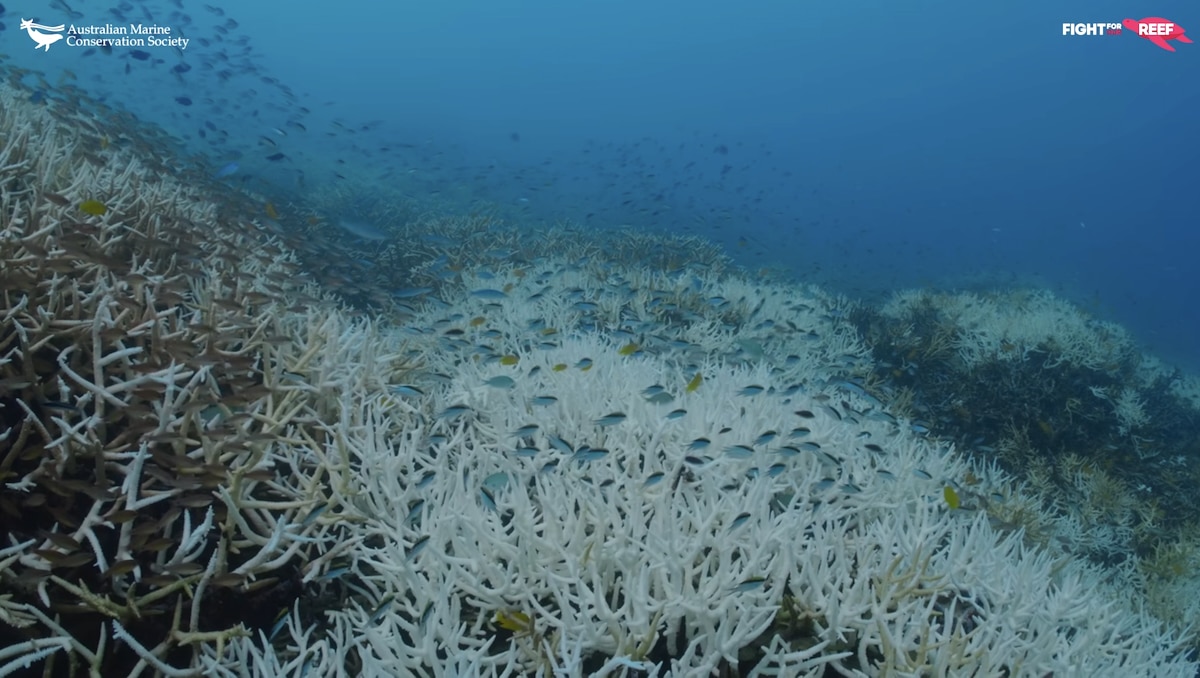Great Barrier Reef Suffering Record Coral Bleaching With Damage 59 Feet Below the Surface

 Why you can trust us
Why you can trust us
Founded in 2005 as an Ohio-based environmental newspaper, EcoWatch is a digital platform dedicated to publishing quality, science-based content on environmental issues, causes, and solutions.
The Australian Marine Conservation Society (AMCS) has released video footage showing that the southern portion of the Great Barrier Reef is suffering from deep-sea coral bleaching, reported The Guardian.
The footage shows that the bleaching extends at least as far down as 59.1 feet — the deepest reported during this mass bleaching event, a press release from AMCS said. Some of the corals have begun to die in the face of record marine heat waves.
“I feel devastated. This bleaching event is the worst I have seen. It’s a severe bleaching event,” said Dr. Selina Ward, University of Queensland’s former academic director of the Heron Island Research Station, in the press release.
Ward reported extensive coral bleaching at all 16 southern Great Barrier Reef sites she had visited, saying it was the worst she had seen in three decades.
“I’ve been working on the Reef since 1992 but this [mass coral bleaching event], I’m really struggling with. The diversity of species involved has been hard to deal with. Look at bleached areas, there are many different species that are bleached – many of which are pretty resistant to bleaching so it’s not a pleasant one,” Ward added.
Last week, aerial survey data showed that 75 percent of the reef had experienced bleaching during the current bleaching event, with much of it classed as “high to extreme bleaching.”
During climate change-driven marine heat waves, extended periods of warmer ocean temperatures cause corals to become stressed, which leads them to expel the algae that live in a symbiotic relationship with them. These algae not only give corals their colorful appearance, but they are also their main source of energy, so long periods without them can lead to starvation.
“This new footage shows extensive coral bleaching in southern reefs, but there are images from the central and northern parts that show bleaching is extensive and severe in some of those areas too. Although in-water surveys will take months, the Great Barrier Reef Marine Park Authority has completed the aerial surveys but only released the data. The authority must urgently release the maps to show to the public the extent and severity of this bleaching event,” said Dr. Lissa Schindler, campaign manager with AMCS, in the press release.
Some southern reef areas have seen elevated water temperatures lasting for a record 14.57 weeks, smashing the previous 11.8-week record set in April of 2020, according to National Oceanic and Atmospheric Administration data.
“The Great Barrier Reef is experiencing an unprecedented fifth mass coral bleaching in eight years. This is worse than the past two mass bleaching events – in 2020 and 2022 – and we may discover as bad as the worst bleaching on record in 2016,” Schindler said. “The Reef has never experienced such extended marine heatwaves before.”
Last week, the Great Barrier Reef Marine Park Authority said surveys of 1,000-plus individual reefs showed that more than 50 percent were experiencing “high or very high” bleaching levels, with less than 10 percent showing “extreme bleaching,” The Guardian reported. About a quarter of the reefs were relatively unaffected.
“Coral species, which were considered resilient in previous marine heatwaves, are this time bleached. We are already seeing coral dying from this level of heat exposure but expect to see more across multiple coral species,” Schindler said in the press release. “The Great Barrier Reef is a global icon, home to thousands of species and worth $6 billion annually to the economy. If this was a bushfire it would be declared a national disaster but because it is underwater and out of sight, it is not getting the attention it should by our leaders.”
Schindler emphasized that, as the reef’s custodian, the Great Barrier Reef Marine Park Authority needs to play a bigger role in addressing threats to the reef related to climate change.
“The Australian Government must lift its emissions reduction targets in line with keeping global warming to 1.5°C – a critical threshold for coral reefs. Australia’s current emissions reduction target of 43% by 2030 is consistent with a 2°C warming pathway, which equates to the loss of 99% of the world’s coral reefs. If the Albanese government is serious about its commitment to UNESCO to protect the Reef, then it must commit to net-zero emissions by 2035 and stop approving new fossil fuel projects,” Schindler said.
The Great Barrier Reef’s plight is directly related to human-caused climate change, and no time must be lost in addressing and mitigating the source of the crisis, Ward explained.
“This bleaching event again brings us to the question, what are we doing to stop the Reef from being lost? I can’t help but wonder what it is going to take for the right decisions to be made. We are really running out of time. We need to reduce our [greenhouse gas] emissions immediately. We cannot expect to save the Great Barrier Reef and be opening new fossil fuel developments. It’s time to act and there are no more excuses,” Ward said in the press release.
Subscribe to get exclusive updates in our daily newsletter!
By signing up, you agree to the Terms of Use and Privacy Policy & to receive electronic communications from EcoWatch Media Group, which may include marketing promotions, advertisements and sponsored content.

 233k
233k  41k
41k  Subscribe
Subscribe 




